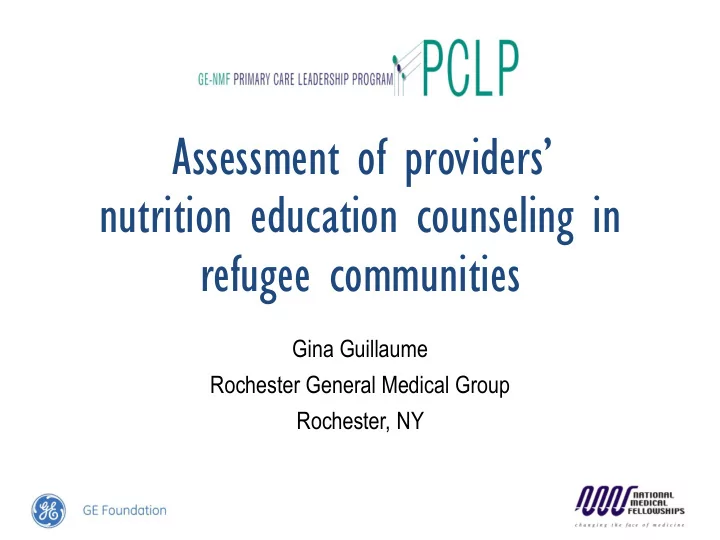

Assessment of providers’ nutrition education counseling in refugee communities Gina Guillaume Rochester General Medical Group Rochester, NY
Introduction • Negative impacts of poor nutrition • exacerbates chronic diseases, negatively impacts cost of care, and diminishes community health • Refugee communities in U.S are at higher risk for chronic diseases and physical inactivity than the general population • Refugee is “a person who is unable or unwilling to return to his or her country of nationality because of persecution on account of race, religion, nationality, membership in a particular social group, or political opinion” (1)
Background • Since 2000, more than 500,000 refugees have resettled in the U.S with an expected increasing number of immigration in the future (2) • Refugees are at risk for poor nutrition due to unfamiliarity with food choices in the U.S • Sedentary lifestyles and continuation of past habits • Refugees in the U.S receive initial health assessments, which seldom includes nutrition counseling (3) • Providers may be faced with nutrition education barriers • Inadequate resources of counseling, lack cultural competency training
Methodology • Provider survey • One page of questions based on provider’s sources, delivery, barriers , and strategies of nutrition education counseling in the refugee community • 1- 5 Likert scale format from “strongly agree” to “disagree strongly and free response options (4) • Survey administered during the 4 th annual North American Refugee Health Conference (NARHC) • NARHC attracts providers across the country, Canada, and internationally • Survey given to attendees of NARHC over a 3 day period (Thursday to Saturday) in Rochester, NY
Results List of refugee community served South- Sub-Saharan Middle South-East Other African (19) Eastern Asian (7) (2) Asian (24) (12) Bhutanese Somalian (8) Iraqi (8) Burmese Cuban (12) (6) (1) Nepali (8) Sudanese (3) Afghan Cambodian Chinese (3) (1) (1) Karen (3) Congolese (3) Yemen (1) Bangladeshi Ugandese (1) (1) Angolian (1) Central Africa Republican Verbal interpretation services to (1) deliver nutrition counseling used with Ethiopian(1) 92% frequency Djboutian (1)
Results Lack of time is major barrier ( 86% frequency) of nutrition education Printed material in pt language ( 86% ) and 1-to-2-day seminar ( 81%) major strategies of nutrition education
Discussion • Predominance of ethnic groups could be dependent on the location of providers • Some cities receive a specific refugee group through resettlement agencies • Questions raised: • What forms of nutrition education materials do providers have access to in order to educate refugee communities? • Further research possibilities: • Survey administered to refugee patients about nutrition education counseling rather than physicians • Possible tangible results of findings • Providers consider an effective approach to nutrition counseling among refugees • Providers offered recommendations that work for them
Recommendations • To eliminate time and interpretation barriers: • Home demonstration video done by the refugees themselves in the patient’s native language about nutrition • Community workshop referred to by providers • DVD made in collaboration with local college students about nutrition education in refugee communities • Separate intervention program is needed or physicians can develop a brief universal method • visual aids to be taken home by patients
Conclusion • Proper nutrition education is important for healthier eating habits and better health; food can serve as medicine • Providers who work with refugees serve a unique role to educate patients about the importance of nutrition education • A more collaborative effort between providers, refugee communities, health advocates, and the government can reduce the consequences of improper nutrition faced in the refugee community
Acknowledgements • Jim Sutton & Dr. Colleen Fogarty • Jennifer Pincus • Staff at Alexander Park Office of Community Medicine • PCLP staff
Recommend
More recommend